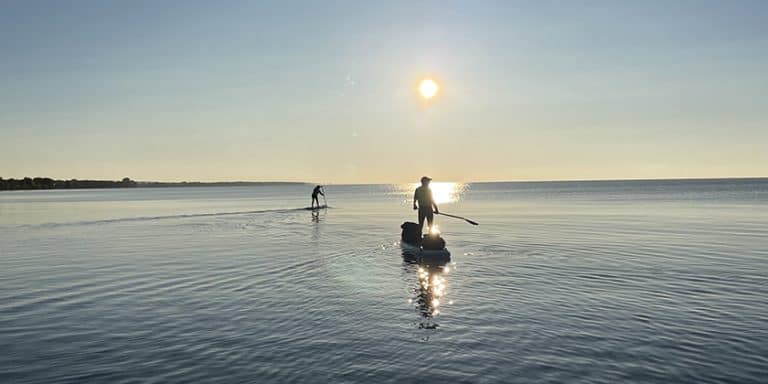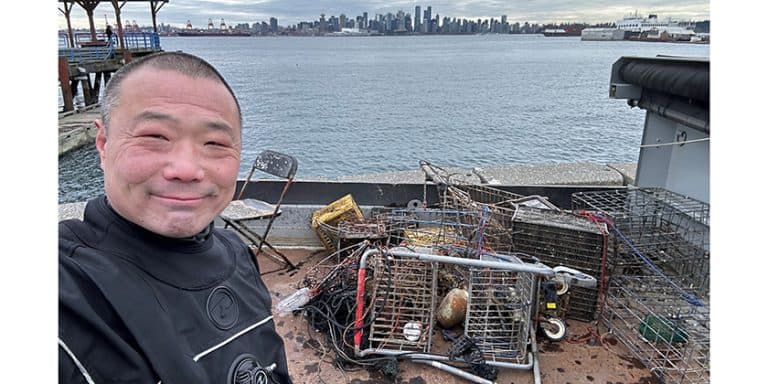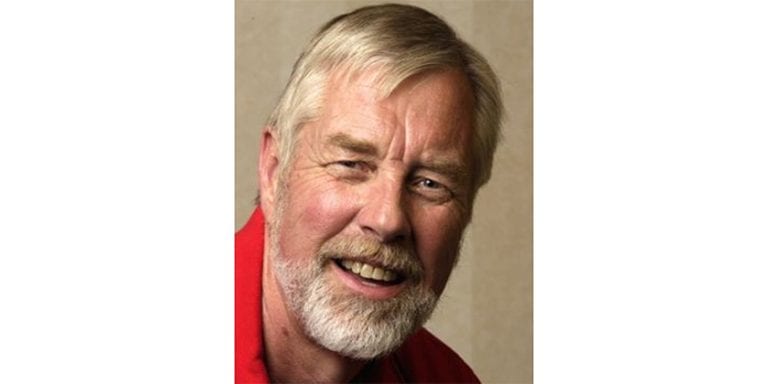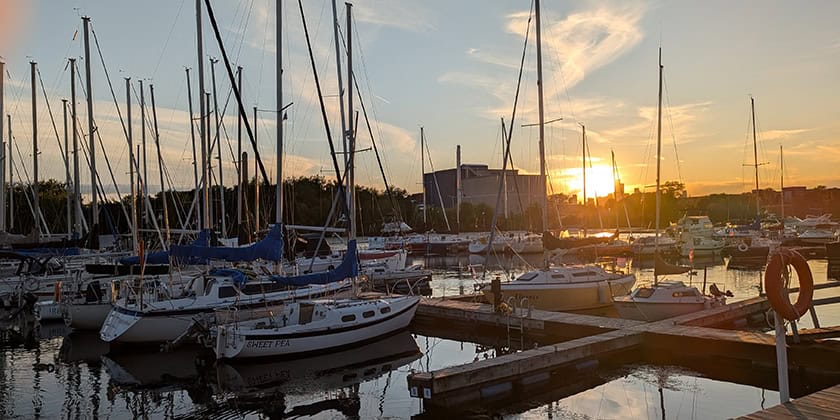The Richter family and the Blind Channel Resort Part 2
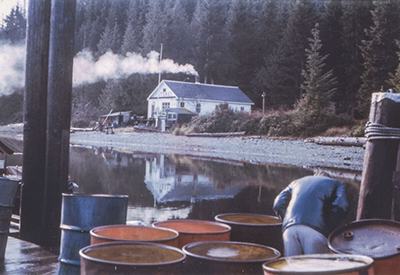
Mar 22, 2018
We needed fuel on our way back south and stopped at a place called Blind Channel on West Thurlow Island. There were two small floats, and numerous fuel drums. A jetty to shore connected to a long boardwalk at the edge of the forest, which led to a small general store. A young man was called on to put on his rain pants, stick a pump into one of the drums, and pump the lever until our tank was full.
A hand-painted sign read “For Sale.” Edgar noticed.
The Move
Edgar hated the shift work at BC Air Lines, the daily commute, the repetition. Blind Channel would present new challenges, and freedom to set the agenda. It just might be possible to swing it with the sale of the house in Vancouver, and then the place would have to provide us with a living. However, Trudi and I were attending Simon Fraser University, Alfred was sixteen, and Robert was ten. There were no schools in Bind Channel. The Vancouver house was a two floor duplex, with Annemarie’s parents living upstairs. We were comfortable, and if Blind Channel was ever going to comfortable we’d have to make it that way.
The boys said “let’s go for it,” and Annemarie said “no way ever.” Edgar continued to extoll the benefits, and she finally agreed to a partial concession. They would fly up and have another look at the place, but if it was raining again that would be it, a definite no.
 The January day turned out to be frosty, sparkling, beautiful, and the house was shortly put up for sale. Trudi found a place to rent nearby. I would stay there until the end of the semester in May and then take a break from school for “a year” to help out. Alfred and William would continue school through correspondence. Annemarie’s parents, in their late sixties at the time, also had a tough decision to make. There was an empty house available for them at Blind Channel and Wilhelm was all for it, but Therese couldn’t imagine living in such a place. They argued, looked half-heartedly for another place in the city, and finally decided to give it a try too.
The January day turned out to be frosty, sparkling, beautiful, and the house was shortly put up for sale. Trudi found a place to rent nearby. I would stay there until the end of the semester in May and then take a break from school for “a year” to help out. Alfred and William would continue school through correspondence. Annemarie’s parents, in their late sixties at the time, also had a tough decision to make. There was an empty house available for them at Blind Channel and Wilhelm was all for it, but Therese couldn’t imagine living in such a place. They argued, looked half-heartedly for another place in the city, and finally decided to give it a try too.
The neighbours once again had some entertainment when large plywood boxes were assembled in the driveway and household goods began to disappear into them. A flatbed truck with a fork lift arrived, and the crates were loaded onto the coastal freighter the “Loughborough Princess” for the journey to the Blind Channel dock. Edgar, Annemarie, Alfred, and William headed north with their yacht Pamar at the beginning of March 1970, with Oma and Opa to join them by plane from Campbell River. I found my way there after finishing my semester at SFU the following spring.
Adjusting
Edgar and Annemarie met after the war working at a craft shop in Germany, creating decorative objects for people trying to rebuild their homes. Aesthetics were always very important to them, and the condition of the property they had bought was painful. There was no garbage pick-up, and evidence of the industrious residents of by-gone days was everywhere. There was no money and no heavy equipment, so cleaning up and beautifying the place to match it’s gorgeous setting would be a slow, hard process.
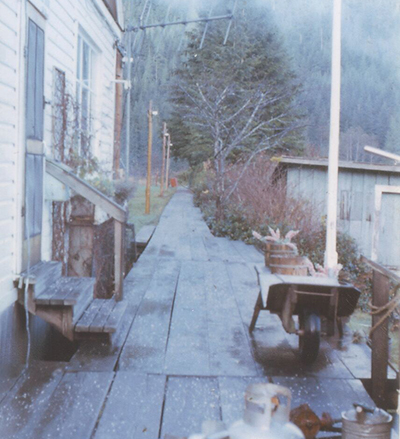 We had voluntarily moved from a first world to a third world lifestyle. Power was on for a few hours each evening, provided by a one-cylinder Ruston diesel equipped with a massive flywheel to keep the voltage more or less steady. We had running water supplied by a spring up the hill, but that became unreliable in the winter. We spent many hours hiking up into the forest to disconnect sections of the black poly line and hauling it down to the ocean to thaw. For back-up, we were lucky to be living alongside a creek.
We had voluntarily moved from a first world to a third world lifestyle. Power was on for a few hours each evening, provided by a one-cylinder Ruston diesel equipped with a massive flywheel to keep the voltage more or less steady. We had running water supplied by a spring up the hill, but that became unreliable in the winter. We spent many hours hiking up into the forest to disconnect sections of the black poly line and hauling it down to the ocean to thaw. For back-up, we were lucky to be living alongside a creek.
If anyone wished to phone us, they would dial 0, ask for the Campbell River Radio Operator, and get placed in a queue. If it was during our stand-by time of two hours each evening, and if the channel became available during that time, we would get the call. In the meantime, we listened to the conversations of workers in the logging camps in the area. If they remembered and asked for privacy the other end of the call would be blocked, so it was necessary to use some imagination. There seemed to be a common theme to the conversations.
“Where were you last night?”
“Where did the money go?”
“ Hi honey, I have to stay in camp this weekend. Love you.” “Operator, I have another call.”
”Hi darling, see you tomorrow.”
 When the technology moved on, we heard complaints from our neighbours. There wasn’t much else for entertainment. We did have an AM radio, and we’d slowly turn the dial, trying to pull something in. A snatch of a great-sounding song faded away into the static, to be replaced by a preacher in Texas booming off the stratosphere. Then we found a wind-up gramophone in an attic with some old 78s and grooved to the sound of “I dream of Jeannie with the light brown hair.”
When the technology moved on, we heard complaints from our neighbours. There wasn’t much else for entertainment. We did have an AM radio, and we’d slowly turn the dial, trying to pull something in. A snatch of a great-sounding song faded away into the static, to be replaced by a preacher in Texas booming off the stratosphere. Then we found a wind-up gramophone in an attic with some old 78s and grooved to the sound of “I dream of Jeannie with the light brown hair.”
Despite all that, we didn’t feel deprived. It felt like an adventure.
March 21, 1970
Letter from Annemarie
We had a lovely ride in the dusk around our neighborhood. The landscape can only be called beautiful. The yellow boat rides very well and this was the first time I was out in it. I really enjoyed myself. There were about thirty cormorants on a rock. In the evening light they looked like cacti, but when we came near they all flew up and away in a single formation.
When we came home, we had a good dinner with plenty of ling cod. Our neighbour Gunnar Lande caught so much that he gave us about thirty pounds. If we could only send some to you.
Alfred went sailing in the dinghy today. It was between tides and the sea was flat, with only a slight ripple and a perfect wind for sailing. He went swish along Eclipse Islet and out of sight. He was gone for a long time and we started to worry. The tide had turned and the rapids were starting to run. The wind had died, and when Papa went out he found him going backwards trying to row against the current. Alfred said of course that he would have managed after a while. It just would have taken a long time. During the course of being towed, he only got wet up to his belly button.
Robert got wet too. He was playing over by the big creek. There he saw a few hundred small crabs, all scuttling around fighting. It looked to him like they all wanted to eat a tiny one. He felt he had to rescue it. He grabbed it out of the middle, took it to a safe place down by the water underneath a stone, and sank into mud to his knees. He was frightened but managed to get out fast. He had a long warm bath and felt fine again.
Maxl is such a hard-working dog. He is not fat any more, but eats a lot. He has to dig holes, when the men dig in the ground, and he has to carry big sticks, when the men carry things around.
It was a beautiful sunny day. The air is so bright and clear and clean. It is so lovely here, that I am slowly beginning to feel a quiet happiness inside of me.
Love,
Annemarie

